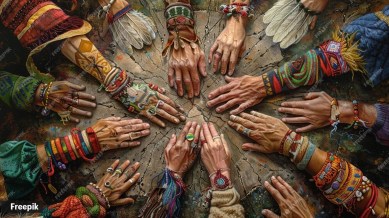International Day of World’s Indigenous Peoples 2024: Date, theme, history, significance—all you need ot know
The International Day of Indigenous Peoples, observed annually on August 9th, promotes advocacy for indigenous rights, raises awareness about challenges like land rights and socio-economic disparities, and includes educational workshops on indigenous history and traditions.

International Day of the World’s Indigenous Peoples 2024 Date and Theme: Globally, around 200 Indigenous Peoples live in remote forests of Bolivia, Brazil, Colombia, Ecuador, India, Indonesia, Papua New Guinea, Peru, and Venezuela, and rely on gathering and hunting to preserve their cultures and languages.
Indigenous Peoples have long sought recognition of their identities, way of life, and rights to traditional lands, territories, and natural resources. Despite their efforts, their rights have been consistently violated throughout history.
With the changes in their natural habitat threatening their survival, in an effort to promote and protect the rights of indigenous populations worldwide, the UN celebrates the International Day of the World’s Indigenous Peoples annually.
This day recognises the unique cultures, languages, and traditions of Indigenous peoples, as well as their contributions to global diversity and sustainable development, in addition to highlighting the challenges faced, such as discrimination, marginalisation, and the loss of their ancestral lands.
Moreover, the day serves as a call to action for governments, organisations, and individuals to uphold the rights of indigenous peoples, promote their empowerment, and work towards achieving justice, equality, and reconciliation. As we celebrate today, here’s all you need to know about the day.
International Day of the World’s Indigenous Peoples 2024: Date and Theme
The International Day of the World’s Indigenous Peoples is observed on August 9 every year. Over the years, various themes have been selected to emphasise different aspects of indigenous rights and well-being.
This year, in 2024, falling on a Friday, under the theme “Protecting the Rights of Indigenous Peoples in Voluntary Isolation and Initial Contact,” highlighting the need for their survival is crucial to the protection of our planet, while also protecting cultural and linguistic diversity.
International Day of the World’s Indigenous Peoples: History and Significance
The International Day of Indigenous Peoples was declared by the United Nations General Assembly (UNGA) in 1994, coinciding with the date when the UN Working Group on Indigenous Populations met in 1982 for the first time.
It aims to strengthen international cooperation and address the problems faced by Indigenous peoples, allowing Indigenous peoples to communicate their concerns globally and raising understanding of their concerns among governments, NGOs, and the public.
The day is crucial as breaches of their rights have become a recurring issue, often due to historical colonisation or changing cultural landscapes.
UNESCO aims to assist Indigenous Peoples in resolving these issues and recognises their commitment to preserving the world’s cultural and biological landscape.
Since then, the day has been observed annually on August 9th worldwide, focussing on themes related to indigenous rights and issues, such as land rights, environmental conservation, education, health, and economic development.
Through cultural events, educational programs, and advocacy efforts, the day continues to amplify the voices of indigenous peoples and ensure their rights are respected globally.